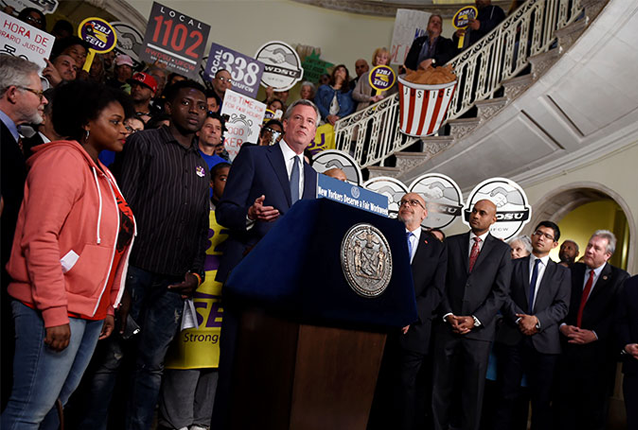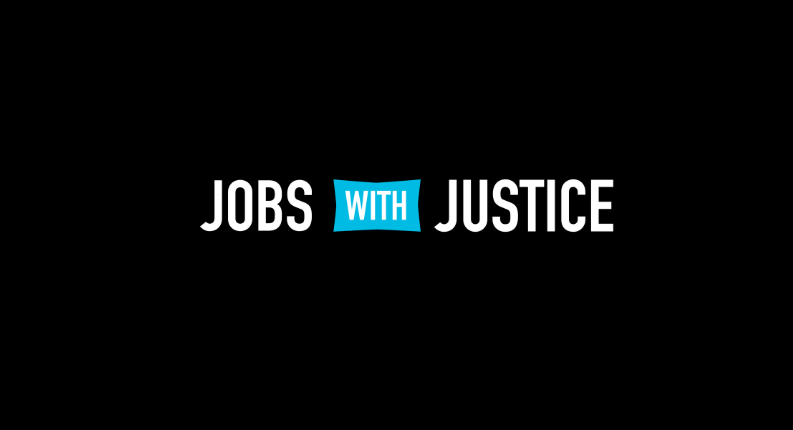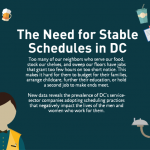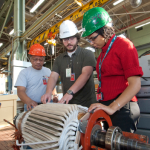On Tuesday, New York City Mayor Bill de Blasio signed into law new rules bringing greater security and stability for men and women working in the fast-food industry.
In recent decades, profitable fast-food giants and retail outlets grant the women and men who make them so successful too few hours on too little notice. Working people who experience unpredictable schedules and insufficient work hours struggle to plan their lives, stay on a budget, make ends meet, and be there for their loved ones.
The new laws will deal with these problems by ensuring that fast-food corporations operating in New York City provide cashiers, cooks and servers two weeks advanced notice of their schedules. To help disincentivize fast-food companies assigning consecutive closing and opening shifts (“clopenings,”) the law stipulates that employers must give sufficient rest time between shifts. The rules also put in place protections against companies forcing people to come into work at the very last minute (on-call scheduling).
In the new rules, New York City outlaws on-call schedules for anyone working at any retail or food-service establishment with 20 or more employees. This law builds on the work of the New York Attorney General’s office to stop companies from using abusive on-call schedules that require employees to keep their lives on hold for schedules they may never be assigned to nor compensated for.
The reforms also create a pathway for more people to earn full-time hours, mandating that fast-food employers offer additional work hours to existing part-time staff before making new hires. In the absence of such a law, many retailers and restaurants have refused to create the family-sustaining, full-time jobs that working people need. Despite massive profits, some companies string their employees along in part-time work, promising but rarely granting enough hours for them to make a living.
The set of New York City laws also allow people working in fast food to designate a part of their paychecks to a non-profit organization of their choosing, recognizing that fast-food workers often engage with nonprofit organizations that support their goals to drive change in their industry and better their conditions. This innovative policy gives working people a say in ensuring that the city enforces these reforms. The non-profit provision may also strengthen the ability of working people to advocate for legal protections the next time corporate America comes up with a way to make their lives and working conditions more difficult in the name of extra profits.
The scheduling improvements are all the more important given the hostile climate with conservatives across the country scheming to take away bedrock protections for working people. Members of SEIU 32BJ, Fast Food Forward, RWDSU, the Retail Action Project, A Better Balance, Make the Road, the Community Service Society of New York and ALIGN were among those leading the charge for the New York City Council to pursue these new standards. Commented 32BJ President Hector Figueroa this week, “As the Trump Administration and Republicans in Washington are pushing legislation and regulation that is disastrous for working people, we have been proud to be part of the resistance standing with New York City fast-food workers in the fight for good jobs.”
The momentum to ensure working people in this country can secure better hours and better lives is building. The Big Apple is the fourth and largest city to establish standards improving work schedules in recent years. In 2014, Jobs With Justice San Francisco led the way in campaigning for San Francisco to enact the first comprehensive package of scheduling rules to ensure working people have a better chance to provide for their families. In 2016, Seattle, Emeryville, and San Jose, CA also passed laws to combat unstable and unpredictable work schedules. Working people and community activists are organizing to pursue similar campaigns in Massachusetts, Oregon, Rhode Island, Connecticut, Minnesota, North Carolina, New Jersey, Washington, D.C., Texas, and elsewhere.







